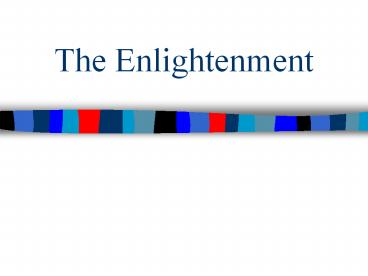The Enlightenment - PowerPoint PPT Presentation
Title: The Enlightenment
1
The Enlightenment
2
Effects of the Scientific Revolution
- During the Scientific Revolution, people began to
believe that the scientific method allowed them
to find answers to their questions
- As a result, new ideas began in areas outside of
science - Especially criticizing absolute monarchy and
thinking of new ideas about government
3
What is the Enlightenment?
- The intellectuals of the Enlightenment (called
Philosophes) believed - The universe could be understood through reason
- Everything in nature could be explained by
natural lawsuniversal truths found through
observation (Religion is not necessary to
understand the world)
4
What is the Enlightenment?
- The belief in progressthe world can be improved
upon perfected - People have natural rightspersonal freedoms that
allow people to enjoy liberty (no restrictions on
speech, religion, or the economy)
5
Political Thinkers of the Enlightenment
- Hobbes, Locke, Jefferson, Montesquieu,
Rousseau, Voltaire
6
Thomas Hobbes
People cannot be trusted. Kings should rule!
7
Thomas Hobbes
- Hobbes believed humans are naturally violent
disorderly citizens need kings to protect them
from themselves (like a father protects his
children) - Hobbes believed that people form a social
contract with the king agree to give up their
freedoms in exchange for the kings protection
8
John Locke
People are good! They have rights should
overthrow the govt when kings abuse their power
9
John Locke
- Locke believed that all people have natural
rights (rights to life, liberty, ownership of
property) - He added to Hobbes Social Contract Theory saying
that people can break the contract when a king
become corrupt - The best government has limited powers listens
to the people
10
Whos ideas are right?
- Locke
- People are reasonable able to make decisions
- People should be able to rule themselves
- Hobbes
- People are selfish, self-serving, brutal
- Without government control, society would be
chaotic
11
Voltaire
Dont be a hater! People should be allowed to say
anything they want, even if you dont like it
12
Questions for discussion
- Voltaire said
- I may disapprove of what you say, but I will
defend to the death your right to say it. - What does this statement indicate about
Voltaires views on free speech?
13
Baron de Montesquieu
Giving one person all the power is a bad idea.
14
Baron de Montesquieu
- Montesquieu wanted separation of powers checks
and balances to keep kings from gaining too much
power in the government - Legislative branch makes laws
- Executive branch enforces laws
- Judicial branch interprets laws
Like Parliament or Congress
Like a king or president
Like a court system
15
Separation of Power
16
U.S. Separation of Power
17
Jean-Jacques Rousseau
Lets make a government that benefits the
majority of people
18
Jean-Jacques Rousseau
- Believed people are naturally good, but power
corrupts them - The best form of government is a direct democracy
that promotes the common good of the majority - People give up some of their individual rights to
be ruled by the general will of the majority
What the majority wants, the majority gets
Like their choice if they disagree with the
majority opinion
19
How did Enlightenment writers and thinkers set
the stage for revolutionary movements?
- Philosophes encouraged people to judge for
themselves what they thought was right or wrong - People began to rely on reason to solve their
social problems - These ideas led to violent revolutions in America
France to overthrow corrupt kings
20
Thomas Jefferson
The American Revolution Declaration of
Independence inspired people around the world t
overthrow their govt form democracy
- Jefferson wrote the Declaration of Independence
(1776) based it heavily on John Lockes ideas - The Declaration explained the reasons for the
American Revolution the that the US govt would
be based on human liberty democracy
21
- Think about each of the following Enlightenment
philosophes identify one way each of them would
try to improve some aspect of Bacon Academy - Thomas Hobbes
- John Locke
- Voltaire
- Montesquieu
- Rousseau































